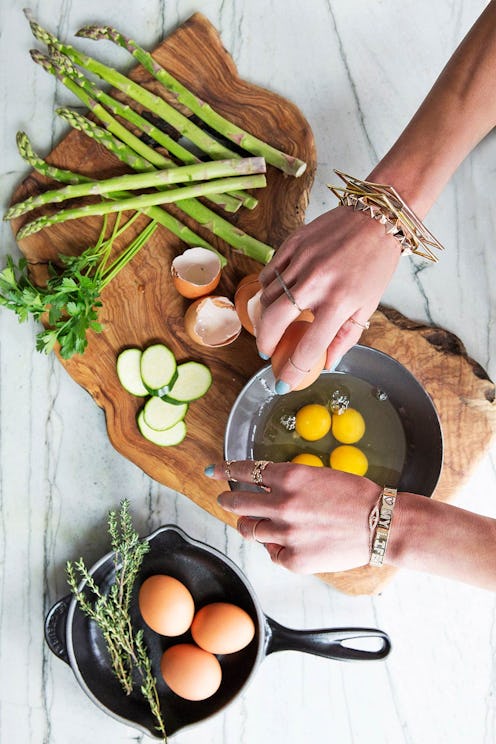These days, it feels like absolutely everything is bad for us, and the constant influx of alarm bells over various foods and products can be overwhelming. In many cases, the key is to proceed with caution rather than panic and move to the top of some far-flung mountain where you’ll live off the land and have limited exposure to, well, anything. That said, we were surprised to learn that the following ten things—all of which are pretty common—are actually not so good for us. Click through to find out how you can reduce the risks associated with these surprising culprits.
Rice
As rice lovers, we hate to be the bearers of bad news; however, Consumer Reports recently found measurable amounts of inorganic arsenic—the most toxic kind of arsenic—in both brown and white rice varieties. As a result, its researchers recommend limiting your intake to two servings per week, as well as reaching for basmati rice from California, which is low in arsenic, or quinoa, also low in arsenic, instead. Read an in-depth report here.
Wearing Headphones
Personal music players can reach 105 decibels, which, according to the Dangerous Decibels Campaign, is a level that can damage your hearing in just 15 minutes. To play it safe, we suggest investing in high-quality headphones, keeping the volume at moderate levels and consuming antioxidant-rich foods, which have been shown to combat hearing loss.
Sit-Ups And Crunches
These exercises are considered outdated by many fitness experts, as they can cause lower back injuries. The US Army revamped its physical training program to exclude sit-ups after one study found 56 percent of injuries from its fitness test were related to the exercise. We suggest replacing your daily (ha!) sit-ups with planks to better protect your back.
Teflon
Non-stick pans are pretty ubiquitous these days, but the Teflon that eliminates the need for excessive elbow grease when you wash also makes your pans toxic when overheated. According to Kurunthachalam Kannan, PhD, an environmental toxicologist at the New York State Department of Health's Wadsworth Center, Teflon-coated pans are safe until they reach 500 degrees. To get a feel for how quickly your pans can reach unsafe temperatures, check out this study by the Good Housekeeping Research Institute.
Skim Milk
When fat is removed from milk, nutrients go with it. Some studies have even found full-fat dairy products are less likely to cause obesity, heart disease and diabetes than low-fat products. As with consumption of any healthy fat, the trick is not to overdo it.
Agave
Ugh—we give up! We thought we were doing good by replacing sugar with agave, but we thought wrong. Agave is high in fructose, and in some cases even higher in fructose than high-fructose corn syrup. Fructose consumption can lead to insulin resistance, which raises the risk for metabolic syndrome and type 2 diabetes. Consume agave in moderation or eliminate it altogether by reaching for whole fruits when your sweet tooth needs a hit.
Your Loofah
Kept in the humid environment of your shower, it can be the perfect breeding ground for bacteria and mold. If you don't want to give up your loofah, look for one made from natural fibers, wring it out after use, let it dry in a cool place and replace it once a month. (Note: You don't want to know how long we've had ours, so if you've been hanging on to yours for much, much longer than a month, don't feel bad!)
Multivitamins
This one has a few caveats. There is no doubt that certain vitamin deficiencies can lead to disease and illness; however, most of us get more than enough of the nutrients we need through our daily diet. Even if you don't eat quite enough whole foods, many processed foods in the US are fortified with vitamins. What's more, some studies have shown overdosing on vitamins can increase risk of certain diseases. (Read more here.) Our advice? If you have a known deficiency, by all means supplement your diet with the appropriate vitamin. If you don't, we suggest adding more whole foods into your diet and checking with a doctor before supplementing with additional vitamins.
Cetaphil
It's an inexplicable favorite of editors and dermatologists alike, yet, as Well + Good points out, it's not actually good for your skin. This cleanser comprises five chemicals—propylene glycol, sodium lauryl sulfate, methylparaben, propylparaben, butylparaben—and doesn’t actually contain any beneficial ingredients. To double-check the safety of your products, visit the Environmental Working Group's Skin Deep website.
Positive Affirmations
Um ... what? Research shows positive affirmations only help those who already have high self-esteem. Those who don't, according to one study, actually feel worse when pushed to think good thoughts about themselves and better when allowed to entertain negative ones. How crazy is that? We suggest trying gratitude instead, which is proven to be beneficial.
